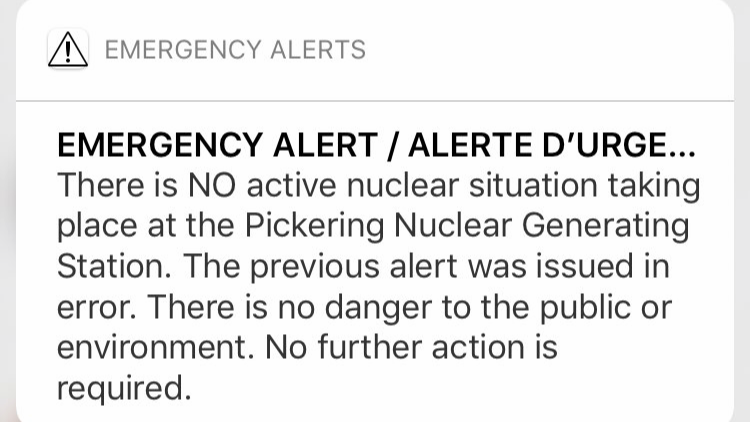
Rachael Dyal
Alert Ready came under scrutiny after an Emergency Alert was sanctioned in error concerning the Pickering Nuclear Generating Station last Sunday.
Many people on Twitter expressed negative, as well as worrisome thoughts regarding the alert system in general.

After the Pickering Nuclear Generating Station emergency error issued on Jan. 12, some users even wondered whether Homer Simpson was running the alert system.
These alerts are often loud to get the public’s attention.
Alert Ready is the Canadian alerting system that sends out alerts to the public regarding safety issues.
The alerts usually get sent through different mediums, and inform the public about a wide array of concerns such as natural disasters, or civil concerns.
Most people know them as either Amber Alerts or Emergency Alerts.
The Ontario Provincial Police oversee issuing Amber Alerts and has criteria that must be met before the alert can be issued.
With regards to these alerts and the Pickering emergency alert incident, many people on social media have begun to question why they receive alerts, especially alerts happening in different locations from where they live.
“When you look at how quickly an alleged abductor could travel with a child, it is something that could happen within a very short time, and the offender could have traveled very quickly,” said Lindsay Lobb, the Policing Relations Liaison for the Canadian Centre for Child Protection.
Lobb suggests there is a lengthy amount of time between the period between a child being declared missing to the police issuing an alert for that child, where the offender may have traveled a great distance from the initial abduction sight.
“I think there’s some real value in remembering that even though you might think that you’re far away from the alert, that it’s not unrealistic that the offender could be in your community,” she said.
It appears having alerts issued to cover all geographical circumferences spread more awareness and increases the possibility of finding a missing child.
Another concern some revealed on social media was the specificity of the alerts. Usually, these alerts tend to be broad, according to some.
Many people on twitter mocked the seriousness of the Pickering Nuclear Station alert due to how vague it was.
“From what I understand it was a training message they used internally, in a closed-loop but for some reason, it went live; I would assume if it were a real emergency, there would be more detailed information,” said Mark Guinto, The City of Pickering’s Public Affairs and Corporate Communications Manager.
He also attributes people’s pessimism regarding these alerts to people not wanting to be disturbed.
Guinto acknowledges these alerts often tend to go off in the middle of the night, waking people up, and when they read the alarm is for a child missing in a geographic area far away, they tend to think the issue doesn’t apply to them.
“It’s like people not taking ownership of the problem, or they feel that they can’t be part of the solution, it doesn’t involve them, so they don’t want to be bothered,” Guinto said.
He suggests some people who complain may not have children so they can’t sympathize, but for parents with young children, they may be able to empathize, and want to be informed when a child goes missing.
“If my child got kidnapped, I’d definitely want it to be broadcasted as far as possible. You never know how far it could help,” he said.
Regardless of the scrutiny, Lobb said she believes the number of complaints is far less than the number of people sharing the alert and keeping others informed.
